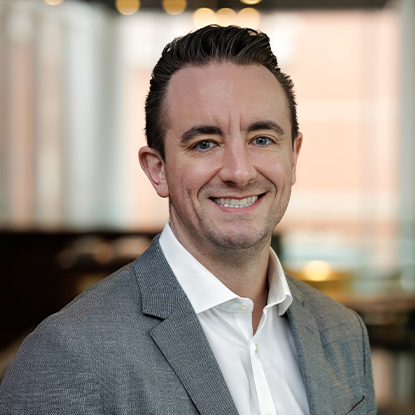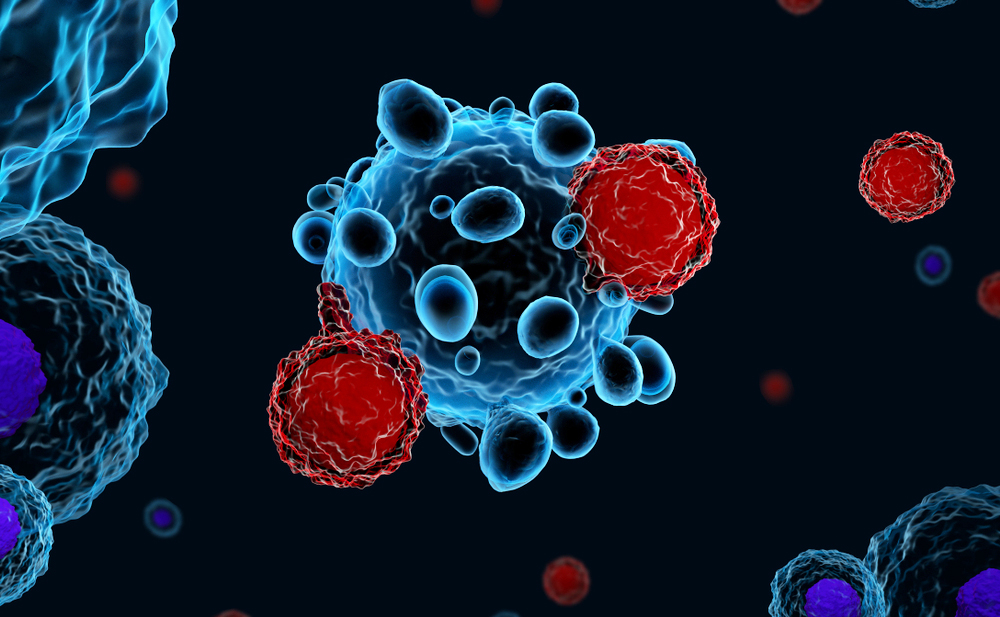In October 2024, John and Ashley Ranelli made a $1 million gift to Massachusetts General Hospital to establish the John and Ashley Ranelli Endowed Scholar in Cancer Innovation. The Ranellis’ goal: to create a highly prestigious and distinguished cancer endowment for clinicians and scientists, from research to point of care, and to help Mass General attract and retain the best and the brightest in the search for treatments.
Matthew Frigault, MD, clinical director of the Cellular Therapy Service, serves as the inaugural Ranelli Endowed Scholar. Dr. Frigault’s pioneering research in chimeric antigen receptor (CAR) T-cell therapies has helped establish Mass General Brigham’s Cellular Immunotherapy Program as a national referral center for both standard-of-care and investigational cellular therapies, and has reinforced his status as a leader in the field.
“In oncology, we’re always afraid to say the word ‘cured.’ We always say we can’t find evidence of disease. Going back to the first discussions I had with people about cell therapy, the tone was that we’re going for cure. Having that kind of starting philosophy is powerful.”
Dr. Frigault shared how he became interested in cell therapies, the treatment’s progress and how the Ranellis’ support is opening doors to new possibilities.
How did you get into cell therapy?
When I was in medical school, I met Carl H. June, MD, who was a trailblazer in the field. I was taken with how passionate he was about CAR T-cell therapy — clearly, this was something that could be big. I worked on CAR T-cells with one of his postdoctoral fellows over the summer and got really excited about the potential. We could engineer the immune system to do more with these new tools and we were making significant progress in oncology. It sounded like a sci-fi approach: we’re going to make cells that attack other cells that are growing out of control. But it worked.
Once I got to Mass General, I had the opportunity to work with Marcela Maus, MD, PhD. I was her first postdoctoral fellow after she started her lab and we were developing the CAR-T cells we hoped to give to patients years down the road. That’s now morphed into a research juggernaut that is making a world of difference for patients.
What outcomes have you seen for patients who undergo this treatment?
In oncology, we’re always afraid to say the word “cured.” We always say we can’t find evidence of disease. Going back to the first discussions I had with people about cell therapy, the tone was that we’re going for cure. Having that kind of starting philosophy is powerful. David Ryan, MD, president of the Mass General Brigham Cancer Institute, says we want to get patients to a place where they’re worried about ailments that come with aging — not their cancer. When you’re talking about cell therapies, you’re talking cure.
When we meet patients getting cell therapy, we know they’re going for a Hail Mary. It’s risky and complicated, but it can give someone a shot when standard treatments haven’t worked. A lot can happen in a 30- to 60-day cell therapy treatment. At the end of it, we see people who are effectively cured, and that’s still the case 10 years later. It’s rewarding and validating to see that kind of response. We’re also expanding the application beyond oncology to chronic diseases. For many of these illnesses, patients are on medications for the rest of their lives. With cell therapy, patients can get one treatment, see a response 30 days later and never need a therapy again. It gives people back a sense of freedom. Fortunately, cell therapies are now moving up into earlier lines of therapy, offering their benefit before patients have to fail multiple lines of treatment.
What is on the horizon for cell therapy?
Even with the successes we’ve seen, we clearly need to do more. The therapies still don’t always provide the results we want, and they only apply to a subset of diseases — right now, we have approved therapies for lymphoma, leukemia, multiple myeloma, sarcoma and melanoma. We need to understand how they work, who they work for and how we can improve them. There’s a lot of potential, and we’re barely scratching the surface. We’re also designing clinical trials for autoimmune diseases like lupus, and we’re exploring applications for multiple sclerosis and amyotrophic lateral sclerosis (ALS).

At Mass General, we’re figuring out how to use our infrastructure to build efficiencies, leveraging the expertise we have so we don’t have to start from scratch in other disease areas with other non-oncology disease specialists. It took years to build this program and treat hundreds of patients a year. We want to make cell therapy cheaper, safer and available to more people, because the impact we’ve seen for patients is so profound.
What does the support of the Ranelli Endowed Scholar mean for your work?
Back when I was in medical school, people said cell therapy was a boutique approach that would be impossible to scale. And when I started at Mass General, there wasn’t a cell therapy group. In a lot of ways, it was a risk for me to take on this field. Then again, there’s always a risk when you start doing something differently. Thanks to amazing mentorship and support from Mass General, the hospital’s oncology group and now from the Ranelli Endowed Scholar, I can take on these high-risk, high-reward projects. The support from the Ranelli Endowed Scholar allows me to take chances, explore more and break the mold. John and Ashley’s approach of fueling innovation allows people the freedom to operate in a complex medical world and swing for the fences on what could be the next big thing.
John often points out that cancer touches everybody. Usually, when people ask me what I do and I say that I’m an oncologist, they think it’s all sad stories. But I can tell them stories of my patients moving forward with life, a life without cancer. I can be optimistic, and John and Ashley are making it possible to see that hope continues forward.
To support Dr. Frigault and physician-scientists discovering new treatments for people living with cancer, make a gift to the Ranelli Endowed Scholar fund or contact us.

